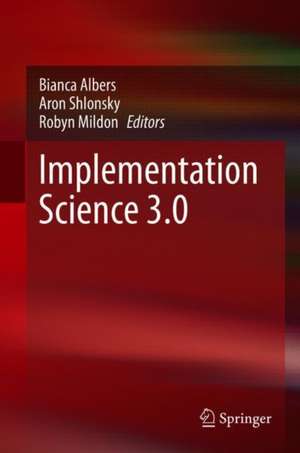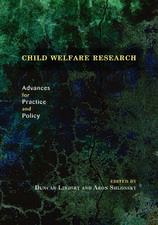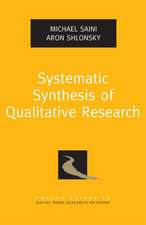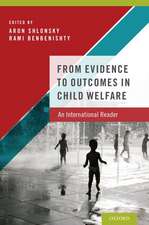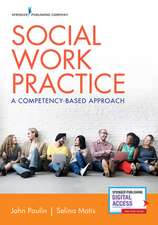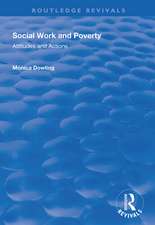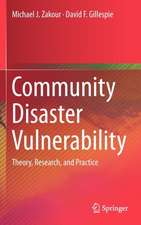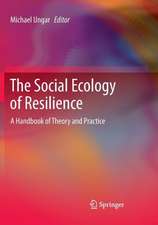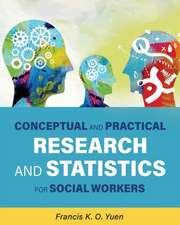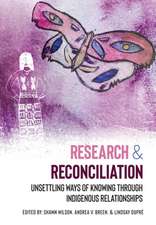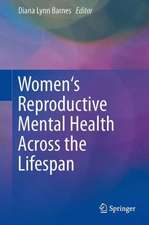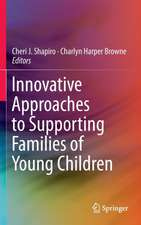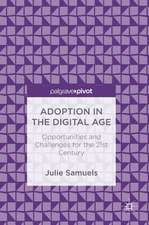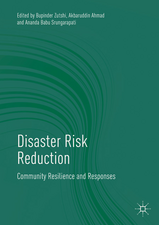Implementation Science 3.0
Editat de Bianca Albers, Aron Shlonsky, Robyn Mildonen Limba Engleză Hardback – 19 mar 2020
production and debate. It captures the latest developments in research and pushes the reader toward the next phase for implementation science: bridging the science-to-practice divide. Drawing from multidisciplinary, international research by top scholars in the field, this book provides a critical but friendly approach to understanding what implementation science is, what it isn’t, and where it’s going.
Topics include:
• Factors associated with effective implementation
• Organizational context and readiness for change
• Implementation theories, models, and frameworks
• Enhancing implementation measurement
• Bringing interventions to scale
• Closing the science-practice gap in implementation
Implementation Science 3.0 is a timely, important resource for researchers, students, and others with an interest in implementation working across the fields of social welfare,public health, education, and psychology.
The chapter “Making sense of implementation theories, models and frameworks”,in which some modifications to the text were made, is available open access under a Creative Commons Attribution 4.0 International License in Nilsen, P. (2015). Implementation Science, 10(53), via link.springer.com.
Preț: 493.47 lei
Preț vechi: 594.54 lei
-17% Nou
Puncte Express: 740
Preț estimativ în valută:
94.43€ • 100.97$ • 78.73£
94.43€ • 100.97$ • 78.73£
Carte disponibilă
Livrare economică 27 martie-10 aprilie
Livrare express 12-18 martie pentru 38.47 lei
Preluare comenzi: 021 569.72.76
Specificații
ISBN-13: 9783030038731
ISBN-10: 3030038734
Pagini: 326
Ilustrații: XXII, 324 p. 27 illus., 14 illus. in color.
Dimensiuni: 155 x 235 x 28 mm
Greutate: 0.66 kg
Ediția:1st ed. 2020
Editura: Springer International Publishing
Colecția Springer
Locul publicării:Cham, Switzerland
ISBN-10: 3030038734
Pagini: 326
Ilustrații: XXII, 324 p. 27 illus., 14 illus. in color.
Dimensiuni: 155 x 235 x 28 mm
Greutate: 0.66 kg
Ediția:1st ed. 2020
Editura: Springer International Publishing
Colecția Springer
Locul publicării:Cham, Switzerland
Cuprins
Chapter 1: En Route to Implementation Science 3.0.- Chapter 2: CUTOS: A Framework for Contextualizing Evidence.- Chapter 3: Making Sense of Implementation Theories, Models and Frameworks.- Chapter 4: Factors Associated with Effective Implementation: Research and Practical Implications.- Chapter 5: Organizational Readiness for Change: What We Know, What We Think We Know, and What We Need to Know.- Chapter 6: Changing Organizational Social Context to Support Evidence-Based Practice Implementation: A Conceptual and Empirical Review.- Chapter 7: Implementation of Effective Services in Community Settings.- Chapter 8: Implementation Teams: A Stakeholder View of Leading and Sustaining Change.- Chapter 9: Advancing Implementation Science Measurement.- Chapter 10: Implementing Implementation: Integrating the Measurement of Implementation and Effectiveness in Complex Service Systems.- Chapter 11: The Scale Up of Linked Multilevel Interventions: A Case Study.- Chapter 12: Closing the Science-Practice Gap in Implementation Before It Widens.
Notă biografică
Bianca Albers
Bianca Albers is a co-founder and the chair of the European Implementation Collaborative (EIC).
She is a seasoned organisational leader, investigator and project manager with 15+ years’ experience in promoting the use of evidence in policy and practice in child, youth and family services in multiple Western countries. With a background in political science she also has a great interest in the field of evidence-based policy and policy implementation.
In her work, Bianca focuses on the development, implementation and evaluation of evidence-informed programs, practices and service models; and on building the capacity within organisations and services to develop, implement and sustain evidence-informed practices and policies. A key element in this work is the identification, selection and translation of current best and relevant evidence.
Aron Shlonsky
Aron Shlonsky is Professor and Head of Department (Social Work) at Monash University School of Primary and Allied Health Care and was formerly Professor of Evidence Informed Practice (Social Work) and Director of the Centre for Applied Research on Effective Services at the University of Melbourne School of Health Sciences.
He is an Associate Editor at Children and Youth Services Review and is Associate Editor at the Campbell Collaboration Knowledge Translation and Implementation Coordinating Group.
After graduating from UC Berkeley with a doctorate in social welfare and a master’s degree in public health, Shlonsky was an Assistant Professor at Columbia University School of Social Work and was then Factor-Inwentash Chair in Child Welfare at the University of Toronto Faculty of Social Work. Shlonsky is known internationally for his work in child welfare, particularly in the generation and implementation of evidence to inform practice and policy as well as longitudinal data analysis in the child and family services field.
Robyn Mildon
Dr. Robyn Mildon is the founding executive director of the Centre for Evidence and Implementation (CEI). Robyn is an internationally recognised leader with a long-standing career focused on the implementation, mainstreaming, and scaling-up of evidence to achieve social impact for children, families and communities in a range of health and human service areas. She has led several national, ongoing initiatives aimed at improving the selection, and use of, evidence in real-world service and policy settings.
In addition to her Australian-based work, Robyn has built a portfolio of projects collaborating with both government and non-government agencies in countries such as Singapore, Norway, Sweden, the USA, the UK and New Zealand, and has been a keynote speaker at multiple events around the globe.
Robyn was the co-chair of the Global Evidence and Implementation Summit 2018, was the founding chair of the Scientific Program Committee for the first and second Australian Implementation Conference (AIC), and a co-chair for the third Biennial Australasian Implementation Conference. She is also the founding co-chair of the Knowledge Translation and Implementation Group with the Campbell Collaboration. Robyn holds an honorary Associate Professorship with the University of Melbourne.
Bianca Albers is a co-founder and the chair of the European Implementation Collaborative (EIC).
She is a seasoned organisational leader, investigator and project manager with 15+ years’ experience in promoting the use of evidence in policy and practice in child, youth and family services in multiple Western countries. With a background in political science she also has a great interest in the field of evidence-based policy and policy implementation.
In her work, Bianca focuses on the development, implementation and evaluation of evidence-informed programs, practices and service models; and on building the capacity within organisations and services to develop, implement and sustain evidence-informed practices and policies. A key element in this work is the identification, selection and translation of current best and relevant evidence.
Aron Shlonsky
Aron Shlonsky is Professor and Head of Department (Social Work) at Monash University School of Primary and Allied Health Care and was formerly Professor of Evidence Informed Practice (Social Work) and Director of the Centre for Applied Research on Effective Services at the University of Melbourne School of Health Sciences.
He is an Associate Editor at Children and Youth Services Review and is Associate Editor at the Campbell Collaboration Knowledge Translation and Implementation Coordinating Group.
After graduating from UC Berkeley with a doctorate in social welfare and a master’s degree in public health, Shlonsky was an Assistant Professor at Columbia University School of Social Work and was then Factor-Inwentash Chair in Child Welfare at the University of Toronto Faculty of Social Work. Shlonsky is known internationally for his work in child welfare, particularly in the generation and implementation of evidence to inform practice and policy as well as longitudinal data analysis in the child and family services field.
Robyn Mildon
Dr. Robyn Mildon is the founding executive director of the Centre for Evidence and Implementation (CEI). Robyn is an internationally recognised leader with a long-standing career focused on the implementation, mainstreaming, and scaling-up of evidence to achieve social impact for children, families and communities in a range of health and human service areas. She has led several national, ongoing initiatives aimed at improving the selection, and use of, evidence in real-world service and policy settings.
In addition to her Australian-based work, Robyn has built a portfolio of projects collaborating with both government and non-government agencies in countries such as Singapore, Norway, Sweden, the USA, the UK and New Zealand, and has been a keynote speaker at multiple events around the globe.
Robyn was the co-chair of the Global Evidence and Implementation Summit 2018, was the founding chair of the Scientific Program Committee for the first and second Australian Implementation Conference (AIC), and a co-chair for the third Biennial Australasian Implementation Conference. She is also the founding co-chair of the Knowledge Translation and Implementation Group with the Campbell Collaboration. Robyn holds an honorary Associate Professorship with the University of Melbourne.
Textul de pe ultima copertă
This textbook presents a much-needed overview of the recent developments in implementation science — a discipline that is young, has gained increasing attention in recent years, and has experienced substantial and rapid growth in knowledge
production and debate. It captures the latest developments in research and pushes the reader toward the next phase for implementation science: bridging the science-to-practice divide. Drawing from multidisciplinary, international research by top scholars in the field, this book provides a critical but friendly approach to understanding what implementation science is, what it isn’t, and where it’s going.
Topics include:
• Factors associated with effective implementation
• Organizational context and readiness for change
• Implementation theories, models, and frameworks
• Enhancing implementation measurement
• Bringing interventions to scale
• Closing the science-practice gap in implementation
Implementation Science 3.0 is a timely, important resource for researchers, students, and others with an interest in implementation working across the fields of social welfare,public health, education, and psychology.
The chapter “Making sense of implementation theories, models and frameworks”,in which some modifications to the text were made, is available open access under a Creative Commons Attribution 4.0 International License in Nilsen, P. (2015). Implementation Science, 10(53), via link.springer.com.
production and debate. It captures the latest developments in research and pushes the reader toward the next phase for implementation science: bridging the science-to-practice divide. Drawing from multidisciplinary, international research by top scholars in the field, this book provides a critical but friendly approach to understanding what implementation science is, what it isn’t, and where it’s going.
Topics include:
• Factors associated with effective implementation
• Organizational context and readiness for change
• Implementation theories, models, and frameworks
• Enhancing implementation measurement
• Bringing interventions to scale
• Closing the science-practice gap in implementation
Implementation Science 3.0 is a timely, important resource for researchers, students, and others with an interest in implementation working across the fields of social welfare,public health, education, and psychology.
The chapter “Making sense of implementation theories, models and frameworks”,in which some modifications to the text were made, is available open access under a Creative Commons Attribution 4.0 International License in Nilsen, P. (2015). Implementation Science, 10(53), via link.springer.com.
Caracteristici
Presents multidisciplinary, international, and applied perspectives from top implementation science scholars Provides a global view of the field of implementation science and details the next phases in its development en route to implementation science 3.0 Uses evidence to challenge the current literature
